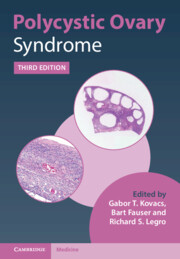Book contents
- Polycystic Ovary Syndrome
- Polycystic Ovary Syndrome
- Copyright page
- Contents
- Contributors
- Chapter 1 Introduction to and History of Polycystic Ovary Syndrome
- Chapter 2 Polycystic Ovary Syndrome: From Phenotype to Genotype
- Chapter 3 The Epidemiology of Polycystic Ovary Syndrome
- Chapter 4 Ovarian Ultrasonography in Polycystic Ovary Syndrome
- Chapter 5 The Classification of Polycystic Ovary Syndrome Informed by the International Guideline 2018
- Chapter 6 The Relevance of the Anti-Müllerian Hormone in Polycystic Ovary Syndrome Diagnosis and Management
- Chapter 7 Origins of Polycystic Ovary Syndrome In Utero
- Chapter 8 Adrenal and Polycystic Ovary Syndrome
- Chapter 9 Polycystic Ovary Syndrome and Environmental Toxins
- Chapter 10 Lifestyle in Polycystic Ovary Syndrome
- Chapter 11 Ovulation Induction in Polycystic Ovary Syndrome
- Chapter 12 Ovarian Surgery for Ovulation Induction
- Chapter 13 In Vitro Fertilization and Assisted Reproductive Technologies in Polycystic Ovary Syndrome
- Chapter 14 Pregnancy Complications and Children Outcomes in Patients with Polycystic Ovarian Syndrome
- Chapter 15 The Role of In Vitro Maturation in Polycystic Ovary Syndrome
- Chapter 16 The Treatment of Obesity in Polycystic Ovary Syndrome
- Chapter 17 Mood Disorders in Polycystic Ovary Syndrome
- Chapter 18 The Long-Term Health Consequences of Polycystic Ovary Syndrome
- Chapter 19 Polycystic Ovary Syndrome
- Chapter 20 Cancer and Polycystic Ovary Syndrome
- Index
- References
Chapter 17 - Mood Disorders in Polycystic Ovary Syndrome
Published online by Cambridge University Press: 13 May 2022
- Polycystic Ovary Syndrome
- Polycystic Ovary Syndrome
- Copyright page
- Contents
- Contributors
- Chapter 1 Introduction to and History of Polycystic Ovary Syndrome
- Chapter 2 Polycystic Ovary Syndrome: From Phenotype to Genotype
- Chapter 3 The Epidemiology of Polycystic Ovary Syndrome
- Chapter 4 Ovarian Ultrasonography in Polycystic Ovary Syndrome
- Chapter 5 The Classification of Polycystic Ovary Syndrome Informed by the International Guideline 2018
- Chapter 6 The Relevance of the Anti-Müllerian Hormone in Polycystic Ovary Syndrome Diagnosis and Management
- Chapter 7 Origins of Polycystic Ovary Syndrome In Utero
- Chapter 8 Adrenal and Polycystic Ovary Syndrome
- Chapter 9 Polycystic Ovary Syndrome and Environmental Toxins
- Chapter 10 Lifestyle in Polycystic Ovary Syndrome
- Chapter 11 Ovulation Induction in Polycystic Ovary Syndrome
- Chapter 12 Ovarian Surgery for Ovulation Induction
- Chapter 13 In Vitro Fertilization and Assisted Reproductive Technologies in Polycystic Ovary Syndrome
- Chapter 14 Pregnancy Complications and Children Outcomes in Patients with Polycystic Ovarian Syndrome
- Chapter 15 The Role of In Vitro Maturation in Polycystic Ovary Syndrome
- Chapter 16 The Treatment of Obesity in Polycystic Ovary Syndrome
- Chapter 17 Mood Disorders in Polycystic Ovary Syndrome
- Chapter 18 The Long-Term Health Consequences of Polycystic Ovary Syndrome
- Chapter 19 Polycystic Ovary Syndrome
- Chapter 20 Cancer and Polycystic Ovary Syndrome
- Index
- References
Summary
Polycystic ovary syndrome (PCOS) is associated with a high prevalence of mental health disorders, including depression, anxiety and eating disorders. There are numerous clinic-based and population studies from around the world showing a high prevalence of both depressive symptoms and depression in reproductive-age women with PCOS compared to controls. These studies indicate that the risk of depression may be independent of obesity and associated with clinical and biochemical hyperandrogenism, with genetic data supporting closely linked biological pathways. Similarly, the risk of anxiety is significantly higher in women with PCOS as compared to a control population. Longitudinal studies depicted a persistence of both depression and anxiety symptoms in women with PCOS over time. First-line treatments for PCOS, including weight-loss interventions and use of hormonal contraceptives, may improve depression and anxiety scores. Recent publications indicate an increased risk of disordered eating and eating disorders in women with PCOS. Given that lifestyle modifications are a first-line treatment for PCOS, early screening and treatment of depression, anxiety and disordered eating are essential for comprehensive management of this population.
- Type
- Chapter
- Information
- Polycystic Ovary Syndrome , pp. 162 - 169Publisher: Cambridge University PressPrint publication year: 2022
References
- 1
- Cited by

